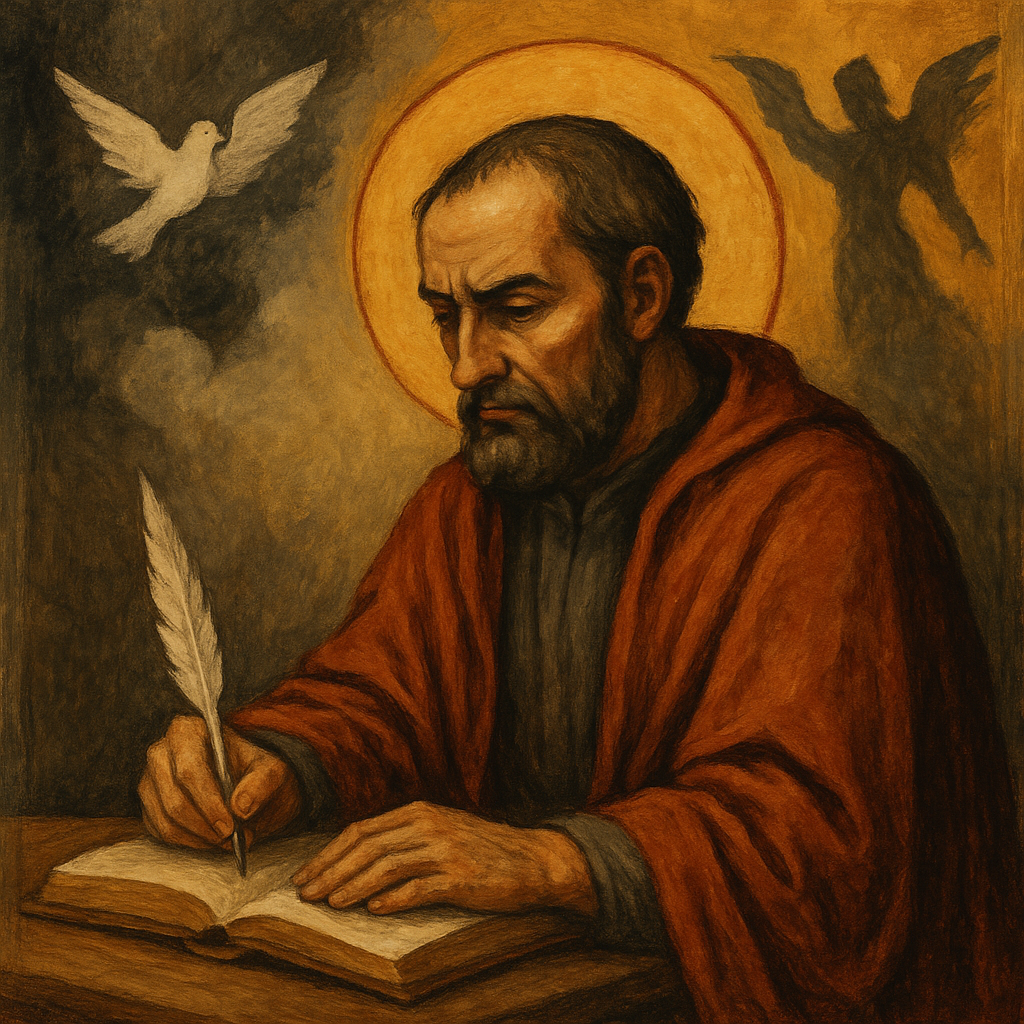
Augustine of Hippo, one of the most influential theologians in Christian history, lived a life marked by contradiction, transformation, and deep internal struggle. His early years, filled with passionate philosophical exploration and disillusionment, played a central role in shaping his theology. In distancing himself from the mystical and supernatural currents of his youth, Augustine developed a more rational and intellectually grounded Christianity. Yet in doing so, he may have overcorrected, sidelining elements of the supernatural that are fundamental to the faith.
The Restless Youth of Agustine
Born in 354 CE in Thagaste, in what is now Algeria, Augustine was the product of a divided household. His father, Patricius, was a pagan; his mother, Monica, a devout Christian. This contrast exposed Augustine to conflicting worldviews from a young age. While Monica attempted to instill Christian values, Augustine gravitated toward the intellectual trends of his time, particularly Manicheism.
Manicheism offered an alluring dualistic cosmology, promising enlightenment through mystical knowledge and a spiritualized understanding of good and evil. It portrayed reality as a battlefield between light and darkness and provided Augustine with what initially seemed like a profound explanation for human suffering and cosmic disorder. He embraced this worldview for nearly a decade. But the movement’s inability to provide coherent, rational explanations, especially regarding the problem of evil, eventually alienated him. Its heavy reliance on unverifiable supernaturalism lost its grip as Augustine matured intellectually.
The Pull of Philosophy
After turning away from Manicheism, Augustine encountered Neoplatonism, especially the works of Plotinus. This school of thought gave him a new lens through which to view the divine, less about magical dualities and more about spiritual ascent through rational contemplation. Neoplatonism introduced Augustine to the concept of a transcendent, immutable God, far removed from the bizarre and cosmic theatrics of the Manicheans.
What Neoplatonism offered was not a rejection of the spiritual, but a reframing of it. The supernatural was not denied, but ordered. This philosophical clarity laid the groundwork for Augustine’s theological system, one rooted in reason, hierarchy, and moral order. Christianity, as he would later articulate it, could align with this model, provided its more ecstatic or mystical elements were reined in or interpreted allegorically.
A Rational Conversion
Augustine’s eventual conversion to Christianity in 386 CE, famously described in Confessions, was deeply emotional, but also steeped in intellectual crisis. His mind had been conditioned to seek truth through structured reasoning. His heart had grown weary of fruitless spiritual wanderings. When he embraced Christianity, it was not the miraculous or supernatural that pulled him in, but the cohesive moral and philosophical system it offered, particularly through the writings of Paul.
Augustine’s faith was sincere, but it was shaped by his earlier experiences. He was not a mystic drawn to visions and wonders. Instead, he sought theological frameworks that could withstand scrutiny. This led him to challenge interpretations of Christianity that he saw as too credulous or emotionally driven. In rejecting his past, he began to distance himself from supernatural manifestations in Christian practice and doctrine.
Theology and the Retreat from the Supernatural
As a bishop and theologian, Augustine mounted vigorous attacks on Manichean doctrine. He rejected its deterministic fatalism, its angelic intermediaries, and its mythological cosmology. But his response extended further. He became suspicious of mystical interpretations of Scripture, warier of miracles, and more critical of claims of divine visions.
In The City of God, Augustine emphasized the sovereignty of divine providence and the ultimate triumph of God’s eternal city over earthly kingdoms. But even here, his tone is cautious toward supernatural occurrences. He allowed for the possibility of miracles but insisted on their rare and providential nature. He warned against gullibility and false wonders, prioritizing faith that was grounded in truth and reason.
This skeptical posture helped shape the theological backbone of Latin Christianity. Augustine’s influence made room for a Christianity that could survive in an increasingly rational and political world. But it also carried consequences. By steering the Church away from supernatural expressions of faith, Augustine contributed to a stream of Christian thought that marginalized spiritual gifts, demonic activity, and divine intervention in daily life.
The Consequences of Overcorrection
While Augustine’s intellectual rigor provided stability for the Church amid doctrinal chaos, it also left a gap. His suspicion of the supernatural was not always matched by biblical precedent, where visions, angelic encounters, exorcisms, and healings are taken as normative in both Testaments. Augustine did not deny these outright, but he often diminished their theological relevance in favor of philosophical allegory or moral interpretation.
The danger of his approach is that it risks undermining core Christian claims: the Incarnation, the Resurrection, Pentecost, the return of Christ—all are supernatural to their core. Augustine’s theological system, while intellectually resilient, edged toward a Christianity that could be explained without mystery. In attempting to correct the errors of his youth, Augustine may have obscured essential elements of the faith he came to cherish.
Conclusion
Augustine’s early life shaped his theology in powerful ways. His rejection of mystical excess and his embrace of reason and moral order reflect a man who had been burned by false spiritual promises. Yet in seeking to secure the faith from emotionalism and irrationality, Augustine often placed too much distance between Christian doctrine and the supernatural reality on which it is built.
His legacy is enduring: a champion of orthodoxy, a master of theology, and a guide for countless believers. But within that legacy lies a cautionary tale, of how even the most brilliant thinkers can overcorrect in the wake of personal transformation. In Augustine’s effort to escape his past, he helped define Christianity for the future, but at the cost of silencing some of its most powerful truths.
Discussion Questions
- How did Augustine’s early experiences with Manicheism shape his later skepticism toward supernatural claims in Christianity?
- Do you think Augustine’s emphasis on reason and intellectual integrity led to an underappreciation of the supernatural in Christian theology? Why or why not?
- In what ways might Augustine’s overcorrection away from supernatural elements impact the way we understand faith and reason in modern Christianity?
- Can Augustine’s theology be seen as a necessary defense against mystical abuse, or as a suppression of genuine spiritual experiences?
- How might Augustine’s legacy have been different had he embraced both reason and the supernatural as equal parts of the Christian experience?
Want to Know More?
- “Augustine of Hippo: A Biography” by Peter Brown
Peter Brown’s comprehensive biography is considered one of the most authoritative sources on Augustine’s life. It provides detailed insights into Augustine’s early influences, his conversion, and the development of his theology. - “The Confessions” by Augustine of Hippo
Augustine’s own autobiographical work, The Confessions, is essential for understanding his inner struggles, conversion, and the philosophical and theological shifts that marked his journey. It offers firsthand insight into his thoughts on the supernatural and his intellectual journey. - “The City of God” by Augustine of Hippo
In The City of God, Augustine lays out his views on the role of the church and supernatural claims in society. It illustrates his balanced but cautious approach to the mystical, shaped by his earlier disillusionment with the Manichean faith and his embrace of reason. - “Faith and Reason: The Philosophy of Religion” by Paul Helm
A useful resource for understanding how Augustine’s intellectual legacy continues to influence Christian thought on the relationship between rational belief and spiritual truth. - “Augustine and the Limits of Virtue” by James Wetzel
This scholarly work explores Augustine’s vision of the moral life, highlighting the tension between his philosophical commitments and his theological convictions.




